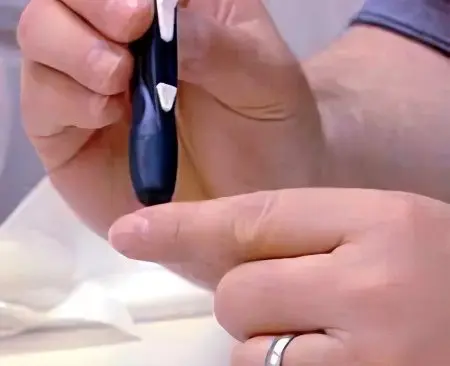Contents
What is hypoglycemia?
Hypoglycemia is a pathological condition characterized by a low level of glucose in the blood (below 3,3 mmol/l).
How does a certain level of sugar form in our blood, and why can it fall to a critical level? After we eat food containing carbohydrates, glucose is extracted from them and distributed to all nooks and crannies of the body. It is the fuel we cannot live without. In response to the entry of glucose into the blood, the pancreas synthesizes a special hormone – insulin, which allows the cells of our body to receive energy from glucose.
A sharp drop in blood sugar is dangerous, because a person can be lost in just 30 minutes. Among diabetics, the phrase is walking: “insulin is a medicine for the smart.” Why do they say so? Because the victims of hypoglycemia almost always become inattentive and irresponsible people who neglect the advice of a doctor and inject themselves with incorrect doses of insulin at the first sign of poor health. No need to panic. You can always avoid danger if you act correctly and consistently.
Hypoglycemia can occur both due to an insufficient amount of sugar consumed in food, and due to increased production of the hormone insulin by the body, which is responsible for the processing of glucose.
Causes of hypoglycemia

Diabetes is of several types. Let’s simplify our story and say that there is an insulin-dependent form of diabetes, and there is an insulin-independent form. So, people with the first type of the disease are forced to inject themselves with insulin in such a way that it is enough to process exactly that amount of glucose (in XE – bread units) that is obtained from food. Injections are given at regular intervals, they are correlated with meals, and the dosage is determined by the attending endocrinologist.
That’s the trouble, because diabetics have nowhere to take a large or at least a standard supply of glycogen. These people consume very little starchy foods, they literally have every carbohydrate in the account (and, in a bad account).
We list in order all the possible causes of hypoglycemia:
Incorrect dosage of insulin;
A long period of time without food at all (more than 6 hours);
Intense physical activity, which entailed the complete depletion of the body from glucose (including the store of glycogen in the liver);
A decrease in blood sugar can also be associated with alcohol consumption.
Hypoglycemia can occur due to an improper diet or the use of certain medications that are poorly combined with antidiabetic drugs (aspirin, warfarin, allopurinol, probenecid, etc.), which enhance the action of insulin. It can be not only specialized tools, like DiaBeta, Glinaz, Prandin, Starlix, Januvia or Diabenez. There are medications that do not belong to the group of hypoglycemic drugs, but still interact dangerously with insulin.
A critical drop in blood glucose levels can provoke hypoglycemic syndrome not only in people with diabetes. Here’s an example from everyday life: an elderly obese man, under pressure from his wife, decided to lose weight. And I didn’t find anything better than to listen to the well-known advice: eat less, stomp more. For a long time he refused the usual food served on the table in the family: potatoes, pasta, cereals. He was practically starving and often complained of headaches.
The crisis came when he went fishing with friends for the whole weekend. The men were cold for two days, hauling gear, rowing boats, and eating almost nothing but fish (i.e., carbohydrate-free food). And to maintain morale, they drank vodka. As a result, our hero lost consciousness and miraculously was taken to the hospital in time, where he finally found out that he had low blood sugar.
If a person does not have diabetes, hypoglycemia may be a symptom of another disease of the endocrine system. To establish an accurate diagnosis, it is necessary to undergo a medical examination and treat the disease that caused this pathological condition.
Symptoms of hypoglycemia

Symptoms of hypoglycemia begin to appear if a person’s blood sugar level falls below the normal value of 3 mmol/L.
In all patients, the disease manifests itself in different ways, so you should know which symptoms you need to pay attention to first.
People with hypoglycemic syndrome often experience dizziness, confusion, nervousness, hunger, headache, and chills. The patient’s pulse quickens, the skin becomes pale, sweating appears, coordination of movements and concentration are disturbed. The person may lose consciousness or even fall into a coma.
It is important to know that hypoglycemia has three levels of severity: mild, moderate, and severe. The lower the blood sugar level falls, the more pronounced the symptoms.
With mild hypoglycemia, the glucometer readings fall below 2,8 mmol / l. The patient feels inexplicable anxiety, nervousness, nausea, hunger, he is shivering, his fingertips or lips go numb; tachycardia may occur.
Moderate hypoglycemia is manifested by a deterioration in consciousness and mood: a person is anxious, irritable, has difficulty concentrating or thinking. Vision blurred, dizzy and headache. Due to weakness and lack of coordination of movements, a person walks and talks with difficulty.
If the blood sugar level falls below 2,2 mmol/l, this is a sign of severe hypoglycemia. This condition can lead to an epileptic seizure, convulsions, loss of consciousness and coma. Body temperature drops significantly.
People suffering from severe hypoglycemia for a long time are prone to the occurrence of diseases of the cardiovascular system, brain damage.
Do not forget that the symptoms of hypoglycemia can be similar to the symptoms of other diseases, so the patient must consult a doctor.
Complications and consequences of hypoglycemia
What is dangerous hypoglycemic syndrome, as such, we have already discussed. But often repeated “collapses” in blood sugar levels are fraught with no less serious problems. Small peripheral vessels are destroyed, and from this, first of all, the eyes and legs suffer. A person may develop angiopathy and blindness over time.
Low glucose levels are extremely dangerous for the brain. This organ is the most voracious in our body, and as soon as it lacks sugar, it begins to frantically honk and demand food. The brain physically cannot do without sugar for a long time, which is why a hypoglycemic coma occurs when the blood glucose level is below 2 mmol / l. If the patient is not resuscitated in time, the brain cells will die, which means death.
Other organs of our body also constantly need glucose and react to its deficiency very painfully. A lot of time would be spent listing all the syndromes and diseases that affect a person with low blood sugar. Let’s just say that this state is better not to allow. How to do it? Read on.
Treatment of hypoglycemia

People who are at risk of hypoglycemic syndrome should definitely carefully monitor their condition and regularly measure blood sugar: situations that can lead to its decrease should be given close attention.
It is very important to notice the first symptoms of hypoglycemia in time and take measures to eliminate them.
If the sugar level falls below normal, you need to drink fruit juice, eat a sugar cube, candy or other carbohydrate-rich food.
People from the close circle of the patient are also required to know the symptoms of hypoglycemia and be able to provide first aid when they feel worse. It is important to carry a health information card or leaflet with you at all times in case you experience a hypoglycemic episode away from home.
In diabetic patients, hypoglycemia can occur due to alcohol consumption or missed meals, so it is necessary to constantly follow a balanced diet, take antidiabetic drugs on time, avoid heavy physical exertion and stressful conditions.
With hypoglycemia, it is better for the patient to refrain from eating simple carbohydrates, but to eat protein foods or complex carbohydrates. During an attack of hypoglycemia, it is also worth carrying glucose tablets or glucose gel with you.
Here is a list of products that can be taken in case of deterioration of the condition:
sweet candy;
fruit juice;
milk;
honey;
sugar;
corn syrup
A quarter of an hour after taking a sugar-containing product, you need to check your blood sugar level. If it does not rise above 3,8 mmol / l, it is worth eating something else from the above products.
If hypoglycemic reactions occur more than a couple of times a week, you should definitely contact your doctor.
People who are prone to hypoglycemia often lose consciousness. In this case, an injection of glucagon, which raises blood sugar levels, is best of all. Dosages and features of the use of this drug should be discussed in advance with your doctor.
To avoid the onset of symptoms of severe hypoglycemia, the patient should always carry sugar, sweets and other foods containing carbohydrates (crackers, cheese, fruit juice, etc.)









